People affected by humanitarian crises are most often the first responders to their own needs, which include protection from violence, coercion, and deliberate deprivation. Nonetheless, it is never their responsibility to ensure their own protection. The primary responsibility for people’s protection lies always with the state or those holding control over a territory. So, what can humanitarian actors do to balance their support to self-protection mechanisms and accountability of duty bearers? Community-led advocacy is an integral part of self-protection efforts and also aims at holding duty bearers to account. Such efforts already exist within communities and are natural to right holders. This session will showcase how partners in different contexts support those advocacy efforts led by communities, the challenges faced, and the main tips they have to share.


